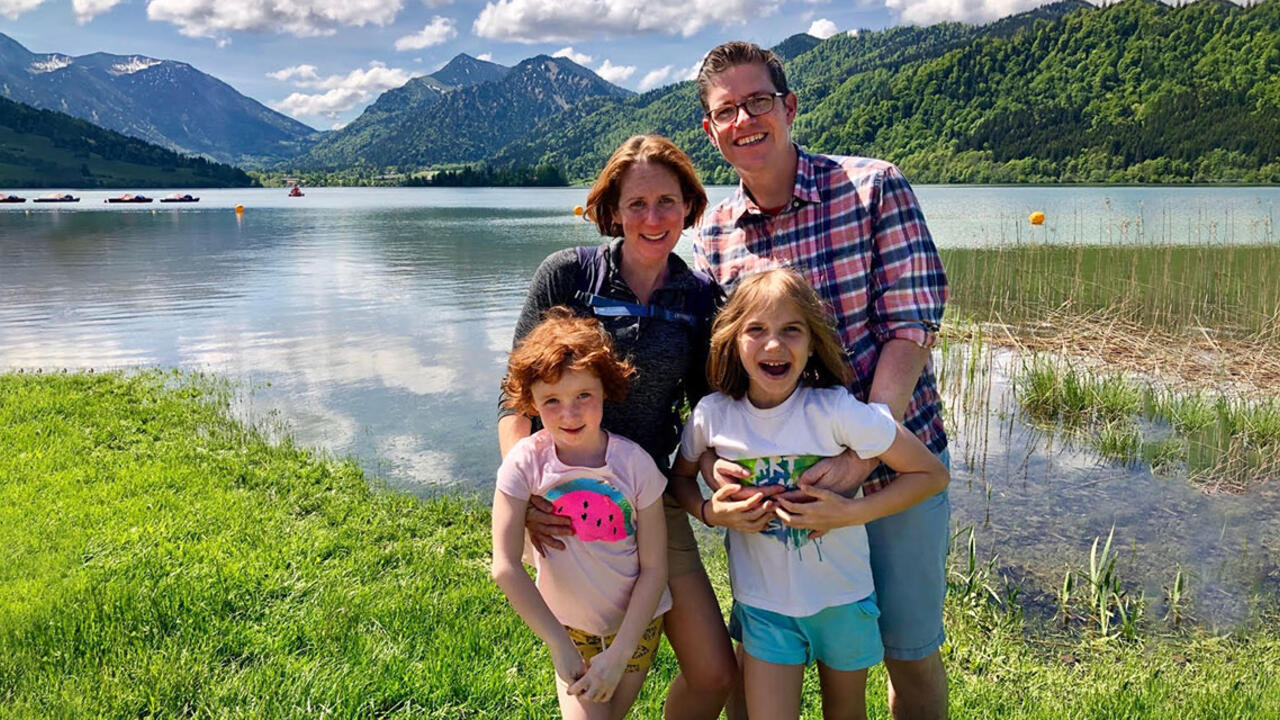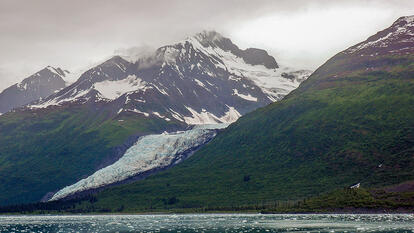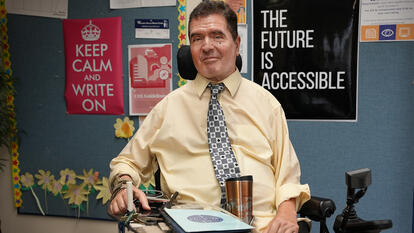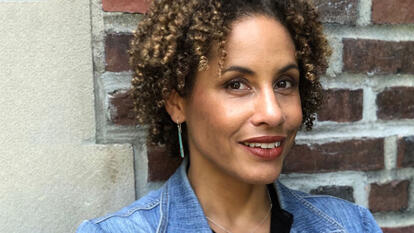What We Did This Summer: Stacie Goddard and Paul MacDonald, Political Science

After the last spring semester exam has been graded and most students have left campus for summer internships, jobs, and travel opportunities, what do Wellesley professors do? Earlier this month, we began a five-part series that looks at faculty members’ summer breaks as they explore, create, collaborate, conduct research, or travel.
Today, Stacie Goddard, professor of political science and faculty director of the Albright Institute, and Paul MacDonald, associate professor of political science, bring us across the Atlantic to Munich, Germany.
Q: What were the highlights of your summer?
Stacie Goddard: This was a really unique summer for us. Both of our scholarly research is in international relations and, for the last few years, we’ve both been researching questions about the rise and fall of great powers. We were both offered the opportunity to participate in a research group at the Center for Advanced Studies at the Ludwig Maximilian University (LMU) in Munich. The group was researching the question of how international institutions adapt in moments of power shifts—moments when one state is increasing its economic or military power, and others are declining.
There were about eight of us in residence at the center at any one time. We both worked independently on our own papers and attended group workshops so we could learn from each other’s work. We all came from a variety of research areas—some specialized in questions of military power, others in international law, others in climate change. Bringing those different perspectives into the same room was fascinating. We also spent a lot of time with our colleagues outside of work. Many of us were in Munich for the first time. Another researcher brought his family, and it turned out our kids were the same age (we brought our daughters with us, who are 9 and 7).
Paul MacDonald: For all of the talk of the globalization of academia, it is surprising how few conversations occur across fields or between scholars from different countries. Being part of the research group was really a special opportunity. Our hosts at LMU—Bernhard Zangl and Andreas Kruck—wrote a framing paper that laid out some of the key questions our group would address. How might the emergence of new powers such as China, India, or Brazil challenge the existing rules or norms of the international system? How might international institutions such as the United Nations, International Monetary Fund, or World Bank, adapt in response? It was then up to us to craft papers that engaged with these questions and with one another. The mix of individual research and group collaboration was definitely the intellectual highlight of the summer.
Because we spent six weeks in residence, we also traveled around Munich and Bavaria to hike in the Alps, explore medieval cities, and visit museums and historical sites.
Q: What does a typical day look like for you during the summer?
Goddard: For me, a summer workday is an equal mix of doing the research, writing it up and, when I need to, going on a hike so I can stop banging my head against the keyboard. During the semesters, I love being engaged with my students and the College but, between teaching, administrative work, keeping up on my research, and taking care of my daughters (and golden retrievers!), I don’t necessarily have a lot of time to step back, evaluate a research question, and think about where I want it to go.
MacDonald: I mostly focus on my research: collecting data, reading through archival documents, writing and editing drafts of articles. I also try to take advantage of the summer to read more widely outside my field and from nonacademic sources. This summer, I read a number of histories of interwar European politics and the rise of fascism. Being able to visit some of the places described in these books gave added immediacy and poignancy to their accounts. The atrium in the main building at LMU, for example, is where Sophie and Hans Scholl distributed anti-Nazi leaflets as part of the White Rose resistance movement. There is a memorial and small museum there now.
Q: What is one thing you want students to know about your work?
Goddard: I try to tell my students, whether they are working on a short paper for class or a longer independent research project, that they are going to need to find people to talk about their ideas. Scholarship doesn’t happen in a vacuum, and even when something looks solo-authored, we rely on our colleagues to help us along. Our colleagues at CAS really pushed us in our work, and we made some great new friends as well. I spent a lot of my summer on the phone or Skype with my co-authors, hashing out new projects.
MacDonald: I think students would be surprised by how much teaching influences my research. One of the research projects I was working on this summer explores the relationship between international law, the rules of war, and decolonization and colonial violence. The original idea for this project came from discussions I had with students in my class on state sovereignty and my seminar on empire and imperialism. So even when I am far from Wellesley, I am thinking about conversations with students and how I might incorporate some of these topics back into the classroom.
Q: What’s the most interesting aspect of your summer that you plan to take with you into the next academic year?
Goddard: All of it! On the research side, I have a few projects I’ll work on throughout the year. On the teaching side, I met some colleagues who do simulations, and I hope to take their work into the classroom, particularly in my Nuclear Politics class next semester. And I also want to keep working on demonstrating how political science research is policy-relevant (I had the chance to do this at the end of this summer, in this commentary on rumors that the current U.S. administration wants to purchase Greenland).
MacDonald: This summer reinforced for me the importance of creating connections between scholarly communities and across different fields. Academics in the United States tend to think about global issues from an American point of view. Spending six weeks in a much different intellectual context helped reinforce the limits of this narrow perspective.
Photo: Stacie Goddard, Paul MacDonald, and their two daughters by Schliersee, a lake in the Bavarian Alps.



